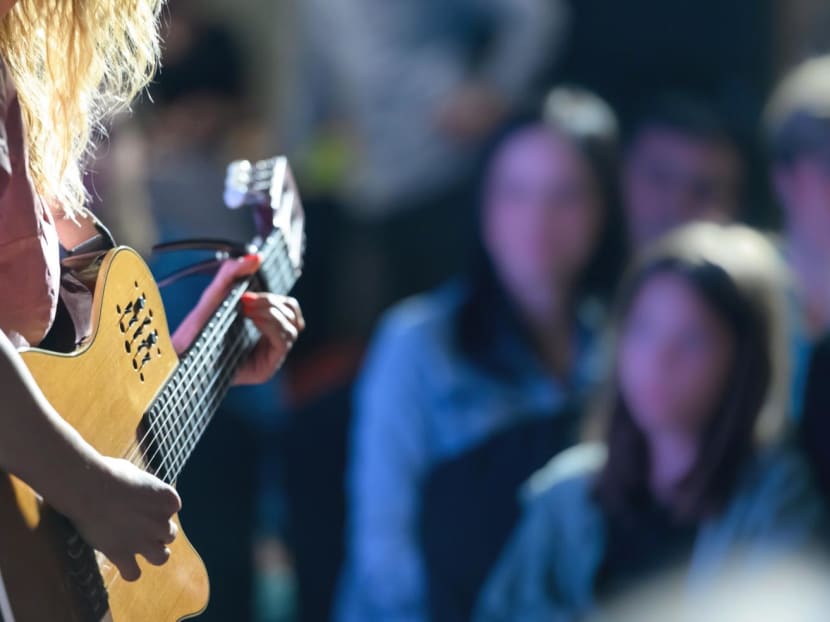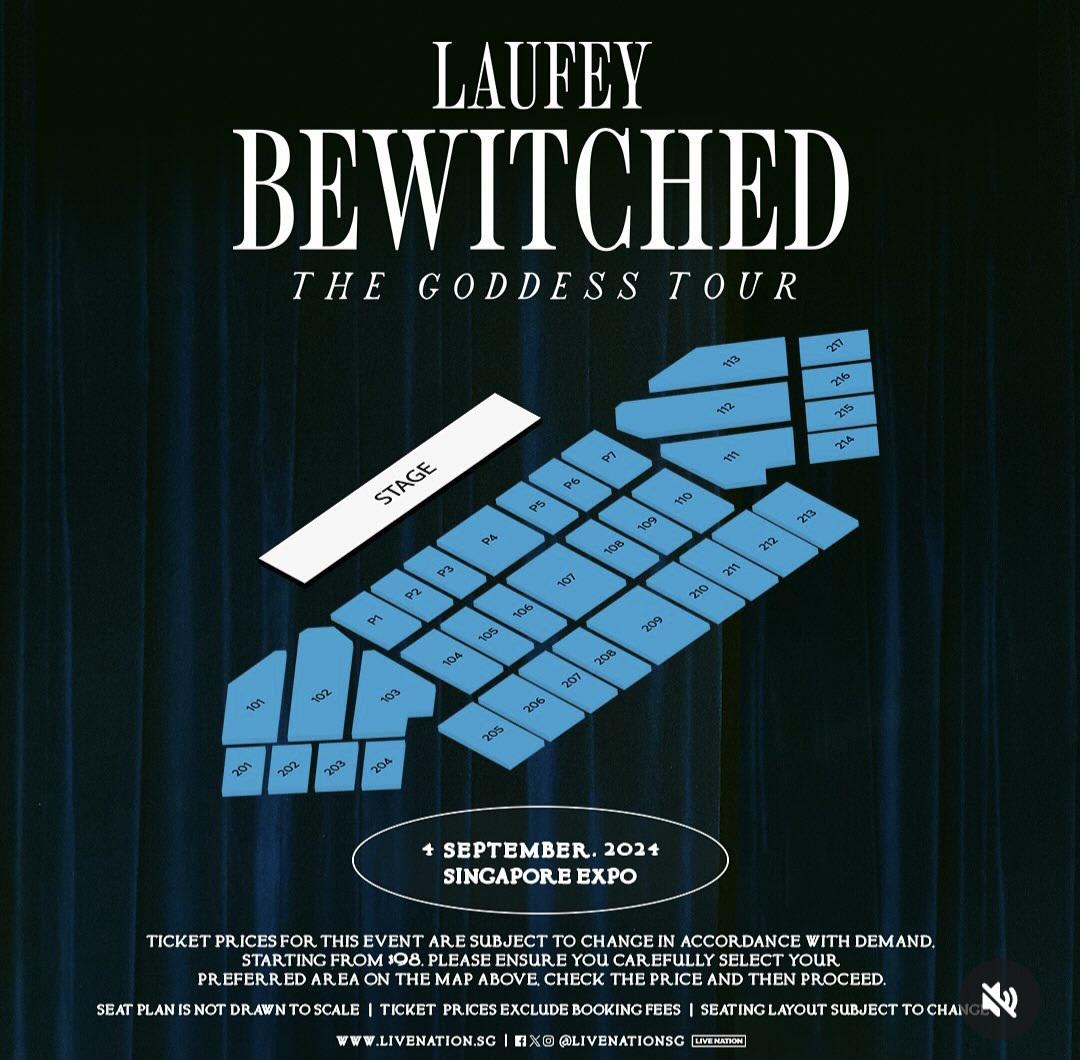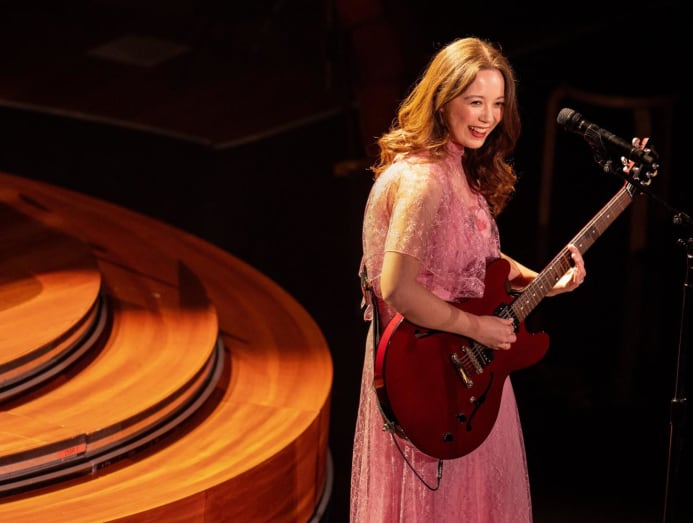Surge prices for concerts, shows? Fans irked as dynamic pricing creeps into S'pore ticket sales

Stock image of a performer on stage.
SINGAPORE — When ticket sales for Singapore’s limited run of the Hamilton musical began last November, an excited Syazwan Ramli, 25, did not hesitate to snag two prime tickets for S$250 each to a Sunday show.
The National University of Singapore law graduate was worried that, like so many cases of highly anticipated stage productions in the past year, tickets for the award-winning musical would disappear as soon as they became available because of zealous fans and scalpers.
So, to Mr Syazwan at the time, there was no need to think twice, he told TODAY.
But his buyers’ remorse set in days after the purchase when Mr Syazwan saw that similar seats for the same category on the weekend were being sold for as low as S$220.
The reason for the price difference? Dynamic pricing was in effect, which meant that prices of tickets fluctuated based on demand, instead of the traditional practice of setting prices upfront based on seat categories.
This is similar to how surge pricing works for ride-hailing, bookings of hotel accommodation and flight tickets.
Under this model, Mr Syazwan paid the maximum price for the category he had selected, though if demand had been low, he would have paid less for the same seat.
"I didn't check whether the prices were cheaper on other dates because I was rushing to get tickets and went with whatever I could get," he said.
"If I had known there would be tickets left and they were cheaper, I would not have rushed and just waited it out... It's really because of FOMO (fear of missing out)."
A GROWING TREND
Dynamic pricing for entertainment events, such as live concerts, musicals and festivals, is a recent trend in ticketing practices used by event promoters to match ticket prices to demand.
In recent years, the US and Canada concerts of American country singer Bruce Springsteen, pop singer Harry Styles, as well as British alt-rock band Coldplay caught flak for implementing dynamic pricing for ticket sales.
Last year, when US fans of pop singer Beyonce fought over tickets for her Renaissance Tour, prices were pushed upwards of US$1,000 (S$1,350) each because of the dynamic pricing model.
Responding to the backlash to the Springsteen concert in the US, American ticket sales platform Ticketmaster said dynamic pricing prevents scalpers from buying tickets at face value and reselling them at higher prices for personal profit.
“Dynamic pricing is about capturing more value for the artist at the initial on-sale, versus that value going to people reselling tickets on the secondary market,” Ticketmaster spokesperson said to US news outlets.
In essence, this means the premium that fans are willing to pay for resold tickets goes to the artists, organisers and promoters directly, rather than to the scalpers.
But in Singapore, concertgoers fear that such a pricing model may now be creeping into the scene and end up raising the prices of tickets overall.
Ahead of Icelandic jazz-pop singer Laufey’s Singapore concert on Sept 4, several fans were up in arms over an announcement that ticket prices would be "subject to change in accordance to demand", with rates starting from S$98.
No cap on prices was announced, unlike during the sale of Hamilton tickets in which promoters said dynamic prices would be limited to S$300, depending on the category chosen.
But prior to the start of ticket sales on Monday, Laufey’s event promoter Live Nation removed a poster displaying the clause that concert tickets were priced based on demand, though its website still showed that information.
It is unclear if tickets were ultimately sold based on dynamic pricing, but the announcement has caused several concertgoers to question whether such a model would become the norm in future.
TODAY has reached out to Laufey's public relations team and Live Nation for comment.

'GUINEA PIGS' FOR DYNAMIC PRICING
Nonetheless, Laufey fans went blindly into the ticketing war as they were only informed that prices started at S$98, several fans who spoke to TODAY said.
Upon entering the ticketing page, they were greeted with a seat map in two different shades of blue.
Seats indicated in light blue were sold for prices above S$200, while tickets in navy blue were cheaper. Hovering over different categories would show different prices within the hundred-dollar range.
But with expected high demand coupled with little time to react before the concert sold out, some fans spent beyond their initial budget to procure the tickets. One 13-year-old fan who wanted to be known only as Irdina left empty-handed.
"We didn't know the specific price until the day of the ticket sales. So when I tried to purchase tickets for the category I wanted, it was way higher than expected," said the secondary school student.
By the time she found a category with prices she could afford, tickets had sold out.
Mr Zachary, 27, is all too familiar with dynamic pricing. The writer and self-professed Taylor Swift fan closely followed the debate around its use for Swift's The Eras Tour in the US last year.
"When I saw Laufey's concert was subject to dynamic pricing, I thought 'Oh, they are doing this in Singapore now?'," said Mr Zachary, a foreigner working in Singapore who declined to share his full name.
"It pissed me off because there was no cap on prices. At least Taylor had a max of about US$1,000 so customers knew what to expect."
Laufey's most expensive ticket went for about S$260, which is 160 per cent higher than the S$98 starting price. This was also S$175 more than tickets for the Icelandic singer's performance in June 2023 at Pasir Panjang Power Station, which were priced at S$85.
Mr Zachary added that concerts in Singapore were often already more expensive relative to other venues around the world, so dynamic pricing feels "unnecessary".
As for 25-year-old civil servant Evangeline Wong, the idea of being the "guinea pig" for dynamic pricing was upsetting, given that such a pricing model for concert tickets was unheard of in Singapore until recently.
"I know that Singapore is trying to position itself as a concert hub, but this anti-consumer tactic (dynamic pricing) is going to make the already frustrating ticketing process worse," said Ms Wong.
While concert promoters elsewhere have claimed that dynamic pricing would deter scalpers by pricing tickets to match what people are willing to pay, Ms Wong felt that the jury is still out on whether this works as scalpers and bots already artificially inflate the demand for concert tickets.
For 27-year-old Christalle Tay, who bought a Hamilton ticket under dynamic pricing, she acknowledged that there will be price differences based on demand anyway, since traditionally, weekend tickets fetch a premium over those for weekdays.
While dynamic pricing does not necessarily mean higher prices all the time, she does not believe concert promoters who implement such a model intend to lower prices for tickets with less demand.
"As a consumer, I’d obviously prefer if prices were fair and equal. Unless the dynamic pricing was to pass on savings to consumers," said Ms Tay, who works as an interpreter. "But I highly doubt it would."

PRICING TICKETS FOR THEIR ACTUAL WORTH: ECONOMISTS
Economists told TODAY that dynamic pricing takes into account several factors — supply, demand, time of day and location. In some industries, like ride-hailing services, the weather might also play a factor.
Like others around the world, dynamic pricing is seen by economists as the most "equitable" way to price entertainment event tickets.
"Historically, entertainment event tickets like sporting events and concerts have been underpriced," said Associate Professor Walter Theseira from the Singapore University of Social Studies, pointing to American football championships The Super Bowl as an example.
"This is because they fear not being able to sell out. There's also publicity if people queue for tickets and fans feel appreciated."
By using dynamic pricing, companies can streamline their offerings according to market demand, allowing them to maximise profits, said Dr Hannah Chang, an associate professor of marketing at the Singapore Management University.
In an ideal sense, dynamic pricing would also allow consumers to benefit as prices are lower due to low demand. This helps ensure tickets are not outpriced and seats are left empty.
But in terms of how fans view a dynamic pricing approach, the experts said there could be a negative impact on consumer satisfaction.
"Though it might help improve efficiency and profits in the process… if fans or concertgoers do not expect it or see it as unfair, this may lead to unhappiness in the market demand side," said Dr Chang.
Assoc Prof Theseira believes that this is because entertainers need to consider fan culture too, which explains why dynamic pricing is generally accepted by consumers for services such as airlines and ride-hailing as the norm, but not for concert tickets.
He said customer satisfaction and loyalty are important for an artist's career longevity, and such pricing methods might be seen as a cash grab.
WHAT MAKES IT FAIR?
To this end, Assoc Prof Theseira said that a dynamic pricing model should also be transparent to consumers so that people can understand how prices are affected.
Given that such a system is relatively new here, there is not enough information for people to understand how dynamic pricing is calculated.
In response to TODAY, Consumers Association of Singapore (Case) president Melvin Yong said that ticket sales practices should be "fair and transparent".
"Case is aware of the growing popularity of ticket surge pricing and is studying potential disamenities," said Mr Yong, who is also a Member of Parliament for Radin Mas Single Member Constituency.
"Events that intend to implement surge pricing for their tickets should inform consumers up front that ticket prices may rise or fall subsequently, so that consumers can make informed purchase decisions."
The Ministry of Trade and Industry (MTI) also said that there is no prohibition on such pricing models between willing buyers and sellers, subject to the terms and conditions of the event organiser.
"Nonetheless, businesses should communicate prices in a clear and transparent manner, including any relevant terms and conditions," said MTI.
"Consumers should also familiarise themselves with such terms and conditions so they can make more informed decisions before making their purchases."
The ministry added it has not received any complaints, but it is monitoring the impact of surge pricing on consumers and the concert ticket industry.








